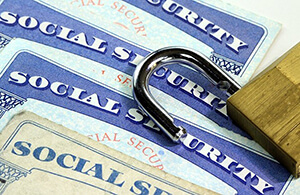Reviewed by: Melissa Rodriguez
Bank fraud is very common today as more of our spending, saving, and other transactions are online. It’s important to stay vigilant to common payment scams, whether those involve wire transfers, digital payment apps, gift cards or cryptocurrency.
The first step is arming yourself with knowledge about evolving fraud tactics, which will help you adopt a skeptical mindset and prompt you to always verify transaction requests independently before engaging with anyone online.
Read on to learn more about what you need to know about how to avoid and protect yourself from scams and fraud.

With 82% of Americans using digital payments, according to McKinsey, there is more danger than ever that bad actors will intercept valuable information or trick people into giving up their money.
Bank fraud is an umbrella term for deceptive practices that criminals use to steal money, personal or sensitive data, or other assets from individuals or financial institutions. Fraudsters use a wide variety of tactics, and their approaches are changing all the time as technology evolves.
Scammers leverage a variety of payment pathways to perpetrate monetary scams. Some of the most common are:
Criminals perpetrate fraud with a variety of approaches. Here are common methods of bank fraud.
In an overpayment scam, criminals send a larger-than-expected payment and then request a refund of the extra. The scammers create a sense of urgency, prompting you to act before their payment has cleared. By the time you realize you’ve sent the scammers money they never gave you, it is too late to recover your loss.
Fake check-cashing scams are similar to overpayment scams, wherein the scammer sends a check and asks you urgently to send a portion of that money back in another form. Avoid this kind of scam by waiting for any check you deposit to clear before doing anything with that money.
Criminals can gain unauthorized access to your bank accounts and steal money before you realize anything is amiss. To avoid this, maintain strong passwords, change your passwords often, and monitor your bank statements. Be cautious about sharing personal information.
Phishing scams involve scammers attempting to get personal or sensitive information such as passwords or credit card details. Criminals might send emails that appear to be legitimate and ask you to provide certain information or click a link for an urgent reason. Be skeptical of any unexpected email asking you to do either of these things.
In government imposter scams, fraudsters pretend to be government officials to pressure you into providing personal information or sending money. Government agencies such as the IRS rarely, if ever, call or email; instead prefer the U.S. mail. Be wary of a “government agency” contacting you by any means but an official letter.
Charity scams involve fraudsters soliciting donations from fake charitable organizations. They may use high-pressure tactics to guilt you into sending money and apply time urgency to discourage you from vetting the organization first. Never send a donation before you’ve verified the legitimacy and reputation of the organization.
In employment scams, fake recruiters extend job offers that they use to capture personal information or money from job seekers. They might send you funds to buy equipment in an overpayment scam. Always make sure the company you’re dealing with is legitimate before going forward with a hiring process.
Romance scams are long-term, emotionally manipulative con games in which a scammer poses as a love interest and slowly gains your trust and empathy before asking for money to solve urgent life problems. Be very cautious of online relationships, especially when the person is quickly smitten, won’t meet you in person, or asks for money.
Sweepstakes or lottery scams trick you into providing personal information or money to collect a prize you’ve supposedly won. Be skeptical of any unexpected windfall and verify the legitimacy of any prize-giving organization that approaches you. Never pay upfront fees to gain access to a prize you’ve “won.”
 Identity theft is a sophisticated fraud scheme in which criminals use your personal information to perpetrate fraud, such as taking out credit cards or borrowing money in your name. This type of crime is extremely disruptive to people’s lives and very difficult to unravel, so it’s important to know how to protect yourself.
Identity theft is a sophisticated fraud scheme in which criminals use your personal information to perpetrate fraud, such as taking out credit cards or borrowing money in your name. This type of crime is extremely disruptive to people’s lives and very difficult to unravel, so it’s important to know how to protect yourself.
There are a number of steps you can take:
Phishing is one of the most common methods scammers use to get personal or sensitive information they shouldn’t have. Here are the top five red flags — things that your bank, the IRS, or other legitimate institution would never send you.
1. Suspicious credentials, formatting or language: If the phone number or the sender’s email address looks odd, it is probably fake. Phishers often use slightly misspelled email addresses to trick you into thinking they’re legitimate. Also, look for strange formatting in emails or messages, poor spelling or incorrect grammar, and generic greetings like "Dear Customer" instead of addressing you by name.
2. Urgent or threatening language: Phishing emails are often urgent, demanding that you take immediate action to prevent a bad outcome. They may also use threatening language to inspire fear and discomfort that will spur you to act before thinking things through.
3. Requests to download attachments or click links: Unsolicited emails with unexpected attachments or links may be phishing attempts. It’s best not to click on these unless you personally know and trust the sender. You can hover over links to preview the URL without clicking to see if it looks suspicious.
4. Demands for personal or financial Information: Legitimate organizations will never ask for sensitive information via email or phone. Anyone requesting passwords, Social Security numbers or bank account details is apt to be a scammer, especially if they initiated the contact with you.
5. Too-good-to-be-true offers: If an opportunity or offer seems too good to be true, it most likely is. Phishers often use such messages to make you feel like you’ll miss out on something amazing if you don’t provide personal information or click on a link.
If you experience bank fraud, act immediately to reduce potential damage and try to recover anything you can. Here are some steps to take right away.
Keeping your money and information safe in this digital age requires constant vigilance and a lot of knowledge. Knowing what types of scams fraudsters perpetrate is the best place to start in protecting yourself. Familiarize yourself with the ways that banks do—and don’t—communicate with customers to help keep yourself safe. Seacoast will never call, text or email you asking you to provide, update or verify sensitive information such as your PIN, social security numbers, debit or credit card numbers, passwords or security codes.
Seacoast treats everyone—customers or not—with integrity and respect. We will never ask you for anything that might compromise your security, and we’re here to help if you find yourself a victim of suspicious activity. We take substantial measures such as 128-bit encryption technology and account monitoring to protect your identity and your accounts against theft and personal fraud. For more tips on fraud prevention, visit www.seacoastbank.com/fraud-prevention.
Topics: Protect Your Finances, Types of Fraud
Are you interested in contacting a local, Florida banker to discuss your individual financial needs? We’d love to speak with you. Schedule a consultation today.
Share: